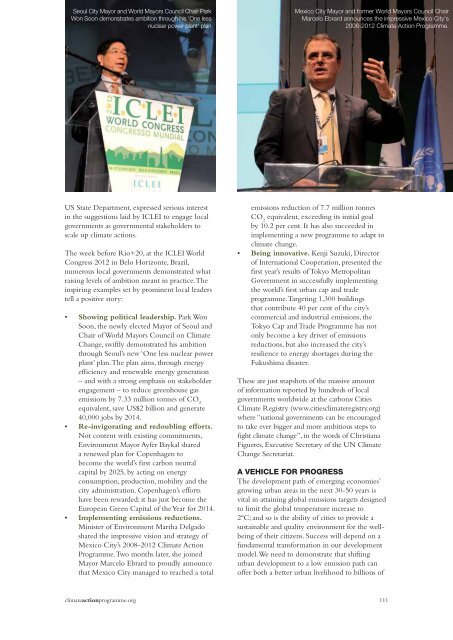Climate Action 2012-2013
You also want an ePaper? Increase the reach of your titles
YUMPU automatically turns print PDFs into web optimized ePapers that Google loves.
Seoul City Mayor and World Mayors Council Chair Park<br />
Won Soon demonstrates ambition through his 'One less<br />
nuclear power plant' plan<br />
Mexico City Mayor and former World Mayors Council Chair<br />
Marcelo Ebrard announces the impressive Mexico City's<br />
2008-<strong>2012</strong> <strong>Climate</strong> <strong>Action</strong> Programme.<br />
THE BUILT ENVIRONMENT<br />
US State Department, expressed serious interest<br />
in the suggestions laid by ICLEI to engage local<br />
governments as governmental stakeholders to<br />
scale up climate actions.<br />
The week before Rio+20, at the ICLEI World<br />
Congress <strong>2012</strong> in Belo Horizonte, Brazil,<br />
numerous local governments demonstrated what<br />
raising levels of ambition meant in practice. The<br />
inspiring examples set by prominent local leaders<br />
tell a positive story:<br />
<br />
<br />
<br />
Showing political leadership. Park Won<br />
Soon, the newly elected Mayor of Seoul and<br />
Chair of World Mayors Council on <strong>Climate</strong><br />
Change, swiftly demonstrated his ambition<br />
through Seoul’s new ‘One less nuclear power<br />
plant’ plan. The plan aims, through energy<br />
efficiency and renewable energy generation<br />
– and with a strong emphasis on stakeholder<br />
engagement – to reduce greenhouse gas<br />
emissions by 7.33 million tonnes of CO 2<br />
equivalent, save US$2 billion and generate<br />
40,000 jobs by 2014.<br />
Re-invigorating and redoubling efforts.<br />
Not content with existing commitments,<br />
Environment Mayor Ayfer Baykal shared<br />
a renewed plan for Copenhagen to<br />
become the world’s first carbon neutral<br />
capital by 2025, by acting on energy<br />
consumption, production, mobility and the<br />
city administration. Copenhagen’s efforts<br />
have been rewarded: it has just become the<br />
European Green Capital of the Year for 2014.<br />
Implementing emissions reductions.<br />
Minister of Environment Martha Delgado<br />
shared the impressive vision and strategy of<br />
Mexico City’s 2008-<strong>2012</strong> <strong>Climate</strong> <strong>Action</strong><br />
Programme. Two months later, she joined<br />
Mayor Marcelo Ebrard to proudly announce<br />
that Mexico City managed to reached a total<br />
<br />
emissions reduction of 7.7 million tonnes<br />
CO 2<br />
equivalent, exceeding its initial goal<br />
by 10.2 per cent. It has also succeeded in<br />
implementing a new programme to adapt to<br />
climate change.<br />
Being innovative. Kenji Suzuki, Director<br />
of International Cooperation, presented the<br />
first year’s results of Tokyo Metropolitan<br />
Government in successfully implementing<br />
the world’s first urban cap and trade<br />
programme. Targeting 1,300 buildings<br />
that contribute 40 per cent of the city’s<br />
commercial and industrial emissions, the<br />
Tokyo Cap and Trade Programme has not<br />
only become a key driver of emissions<br />
reductions, but also increased the city’s<br />
resilience to energy shortages during the<br />
Fukushima disaster.<br />
These are just snapshots of the massive amount<br />
of information reported by hundreds of local<br />
governments worldwide at the carbonn Cities<br />
<strong>Climate</strong> Registry (www.citiesclimateregistry.org)<br />
where “national governments can be encouraged<br />
to take ever bigger and more ambitious steps to<br />
fight climate change”, in the words of Christiana<br />
Figueres, Executive Secretary of the UN <strong>Climate</strong><br />
Change Secretariat.<br />
A VEHICLE FOR PROGRESS<br />
The development path of emerging economies’<br />
growing urban areas in the next 30-50 years is<br />
vital in attaining global emissions targets designed<br />
to limit the global temperature increase to<br />
2ºC; and so is the ability of cities to provide a<br />
sustainable and quality environment for the wellbeing<br />
of their citizens. Success will depend on a<br />
fundamental transformation in our development<br />
model. We need to demonstrate that shifting<br />
urban development to a low emission path can<br />
offer both a better urban livelihood to billions of<br />
climateactionprogramme.org 111












